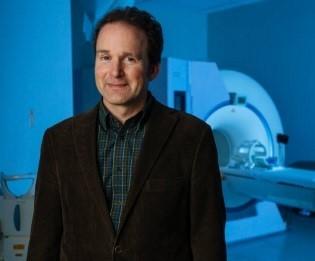Dr. Alan Wilman
Professor and Associate Chair (Graduate Studies)
Dr. Wilman trained as an MRI physicist, becoming an expert in how MRI works. He spent three years at Mayo Clinic where he began to appreciate the difference one could make in disease diagnosis and in patient comfort by advancing MRI methods. He returned to Edmonton where he had grown up, beginning as an Assistant professor in 1997. Dr. Wilman’s interests have been advancing brain imaging methods and have evolved into a focus on Multiple Sclerosis. When he was first learning about MS back in early 2000's he was shocked to find that the cause was unknown and there was no effective treatment for Progressive MS. He found a niche for his expertise in advancing MRI to develop methods that could be applied to MS. The focus of his research team’s methods has been in bringing actual measurements to MRI rather than just looking at the MRI pictures. Adding this "quantitative" element has the potential to give more information on the underlying MS disease processes which include inflammation, neurodegeneration and demyelination. Another aspect of his work has been the use of a triple-strength MRI machine. This machine views the brain in ways not possible with a standard MRI machine, similar to using a much higher-powered microscope to bring out new features. Currently, his research team is translating these findings into studies using everyday standard MRI systems, as used in most MS MRI exams.
Learn more about Dr. Wilman
How did you become interested in MS research? What inspires you to continue advancing research in this field?
I was first introduced to MS in 2007 by Dr. Ken Warren an MS neurologist who founded
the University of Alberta MS program. Dr. Warren was quite an inspiration to me for his dedication to MS patients and MS research. He retired around 2014.
The more we learn about MS and MRI methods, the more I wish to make a greater contribution to new findings. The inspiration arises from the research itself where we can see the value of MRI moving forward and the potential benefits of this research for individuals with MS.
What do you enjoy most about doing research and what are some of the challenges you face?
I enjoy interacting with others and the satisfaction of new discovery and occasionally seeing these discoveries used more widely. However, research often involves many hours of brute force work in the company of just a computer.
Describe the importance and level of collaboration in your research?
Collaboration is key. We need the expertise of a series of specialists to completely cover the MS knowledge required. None of us alone has this expertise.I provide MRI expertise, my neurology colleagues MS expertise and neuroradiology colleagues provide diagnostic MRI knowledge. Together we make a great team with very different expertise. Another core piece of the collaboration is with my graduate students.
How important is the support from the MS Society in enabling you to conduct research?
The MS Society funding is central to us being able to do this research. Since our research involves MRI, it is quite expensive. One cannot do this type of research without grant funding.
If you could ask one question to a person living with MS that would help you design your study, what would it be?
How long should an MRI exam take and what don't you like about it?
